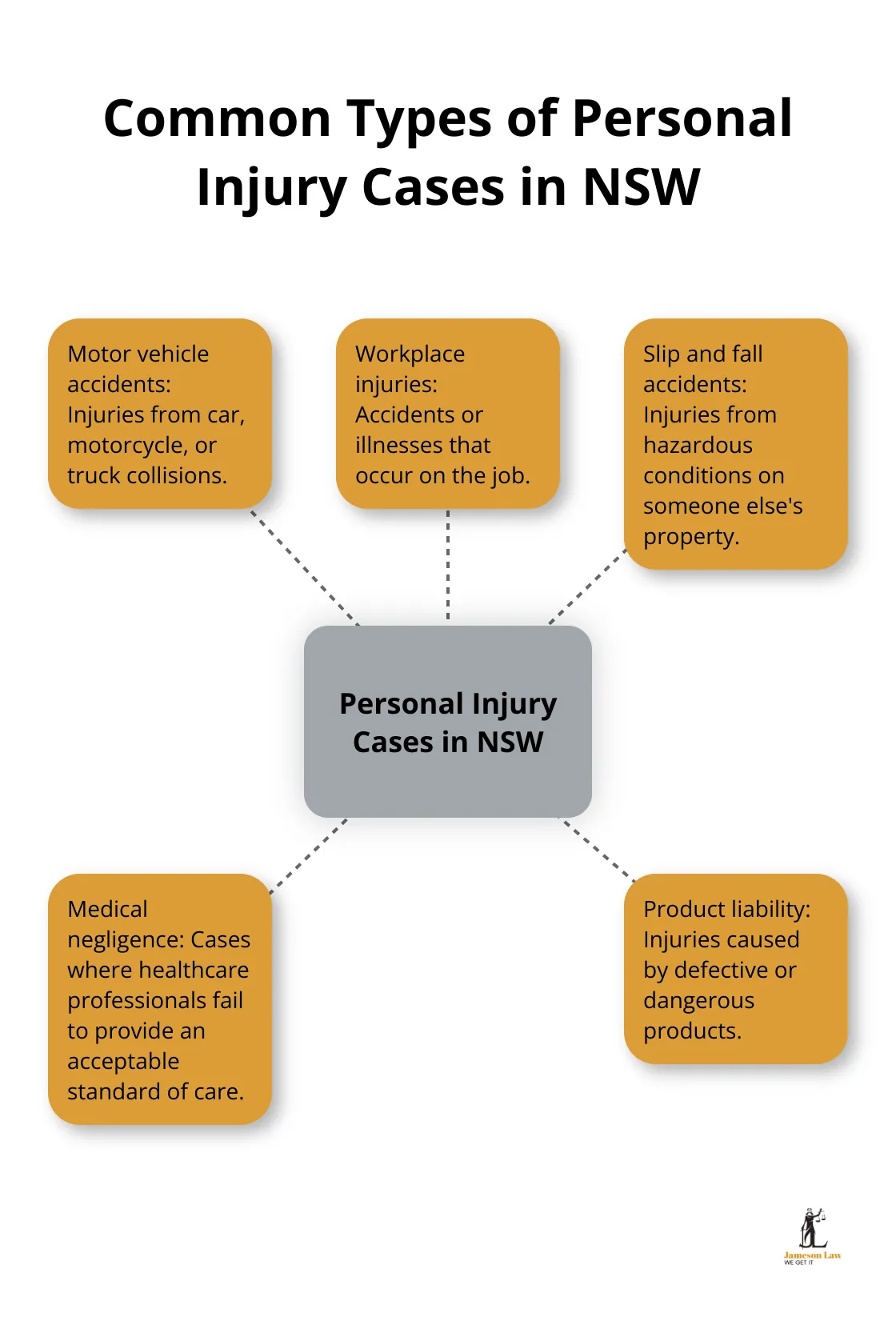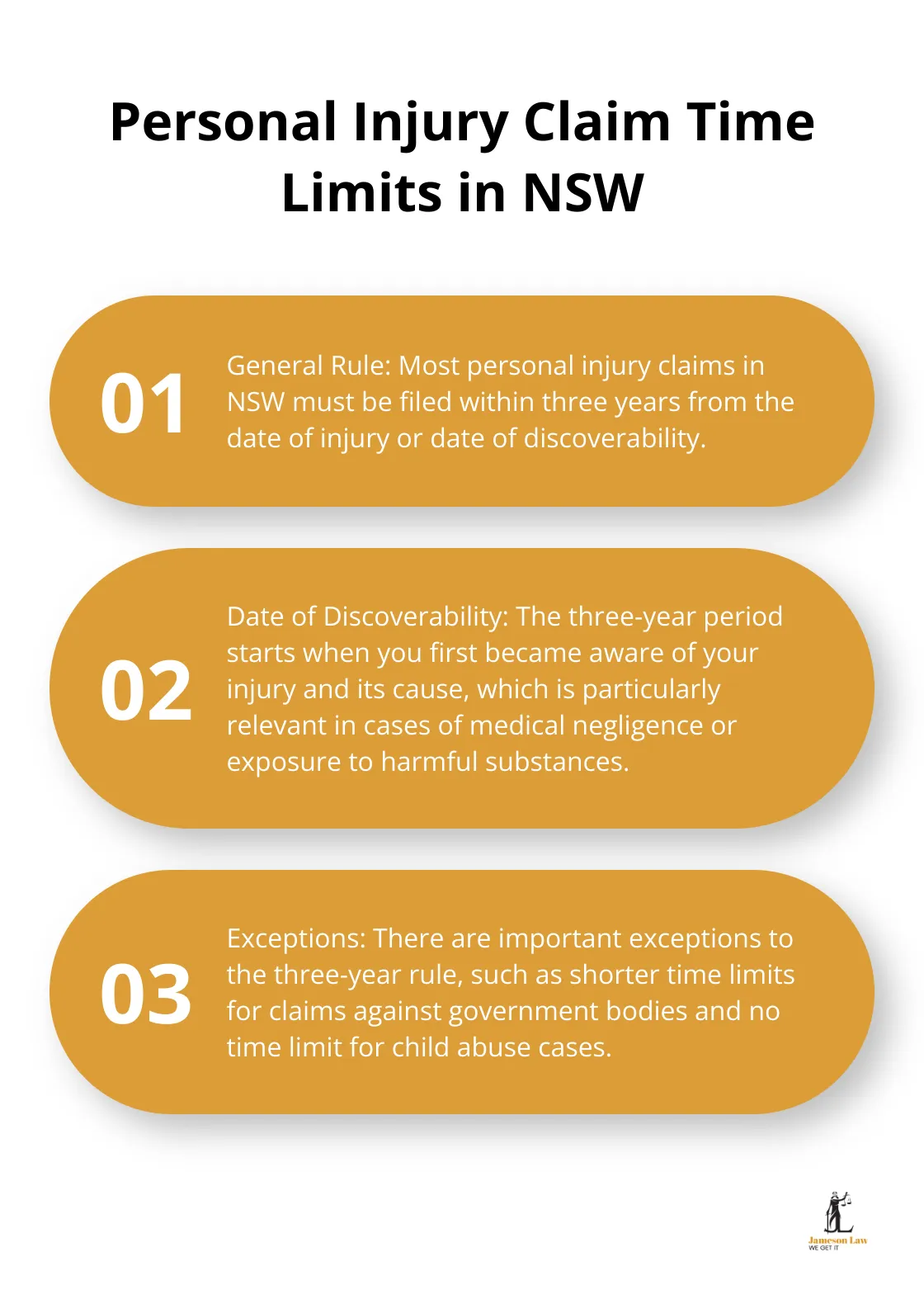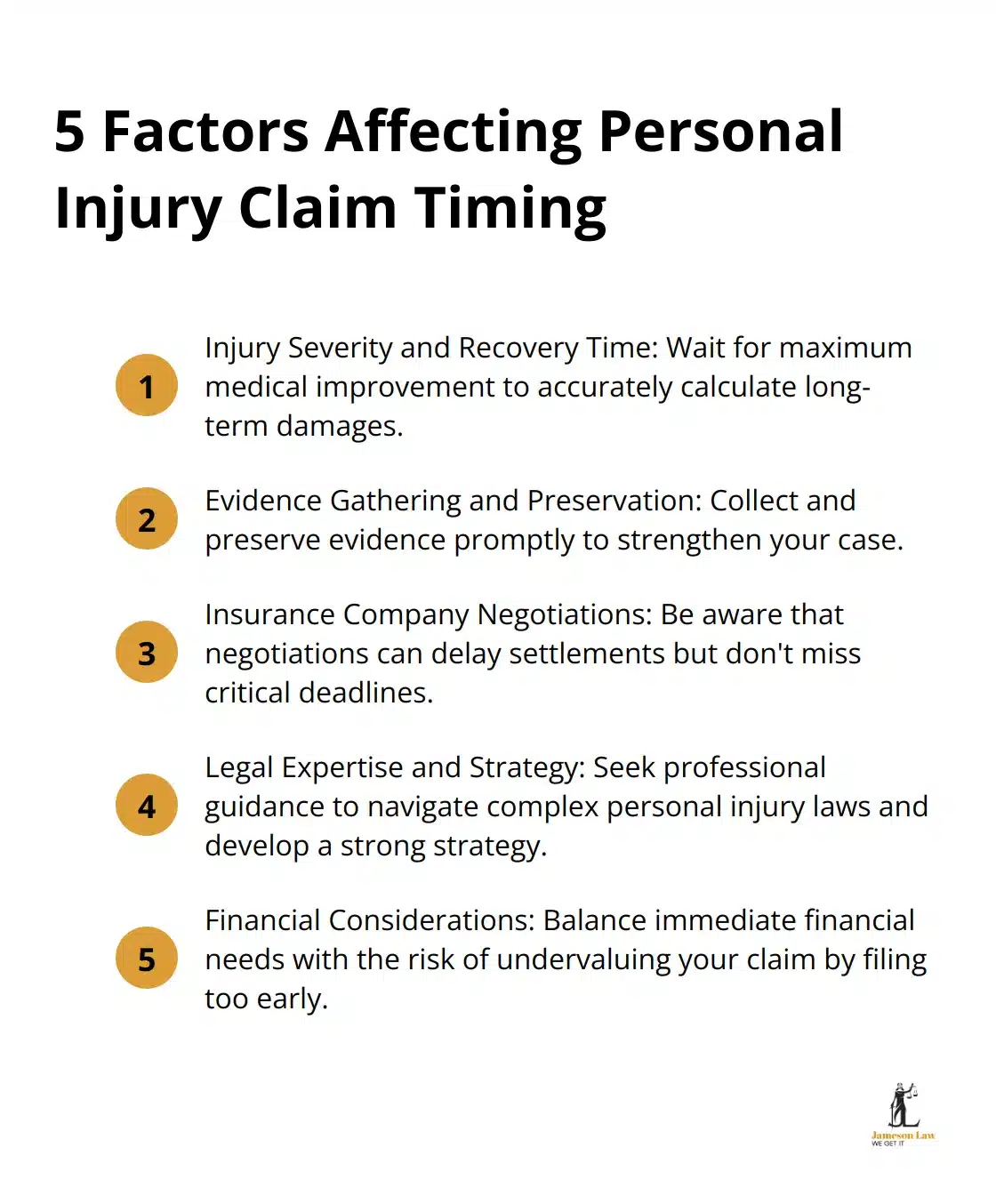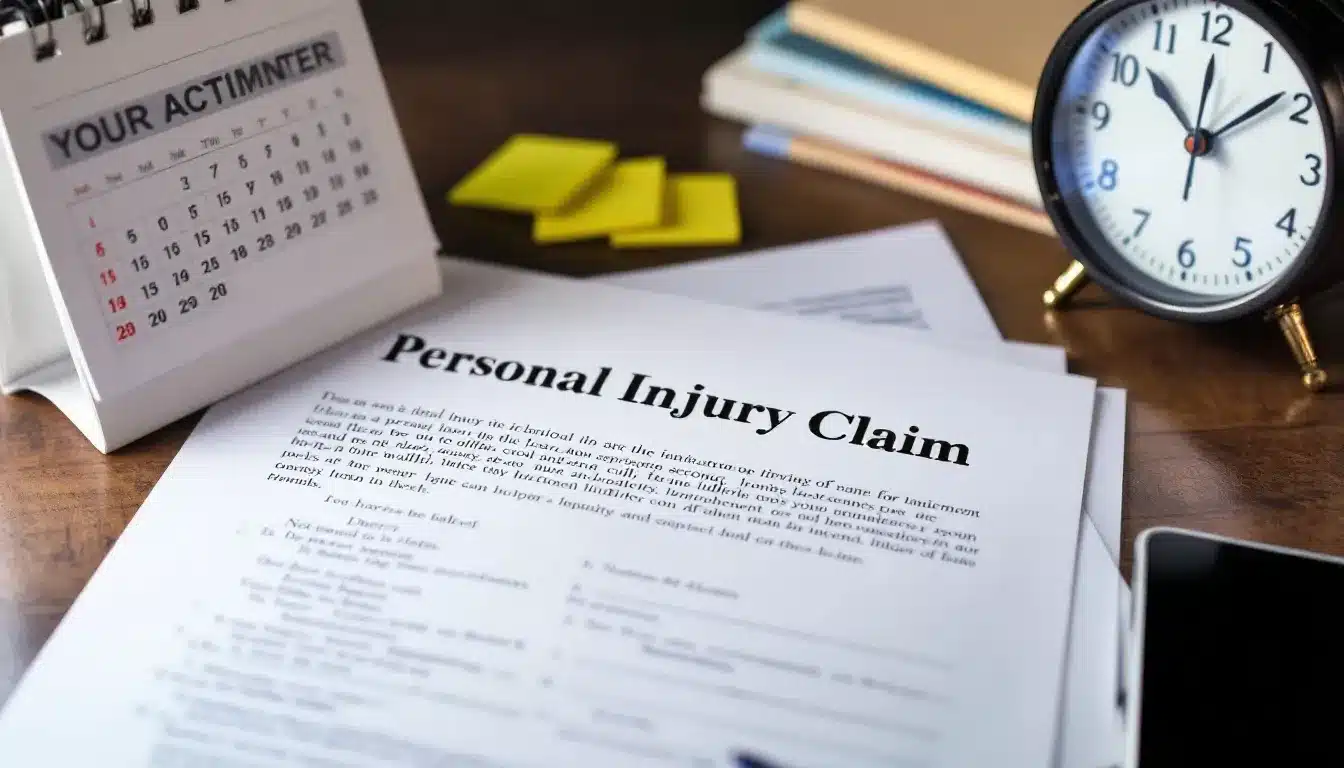At Jameson Law, we understand the importance of timely action in personal injury cases.
Knowing the personal injury claim time limit is crucial for protecting your rights and securing fair compensation.
This guide will walk you through the key deadlines and factors that affect when you should file your claim in New South Wales.
What Are Personal Injury Claims in NSW?
Personal injury claims in NSW are legal actions individuals take when they suffer harm due to someone else’s negligence or wrongful conduct. These claims seek compensation for the injured party to cover medical expenses, lost wages, and other damages resulting from the incident.
Common Types of Personal Injury Cases
NSW sees a variety of personal injury cases. Some of the most frequent types include:

- Motor vehicle accidents: Injuries from car, motorcycle, or truck collisions.
- Workplace injuries: Accidents or illnesses that occur on the job.
- Slip and fall accidents: Injuries from hazardous conditions on someone else’s property.
- Medical negligence: Cases where healthcare professionals fail to provide an acceptable standard of care.
- Product liability: Injuries caused by defective or dangerous products.
Transport for NSW reported 15,364 road crashes resulting in injury in 2022, highlighting the prevalence of these cases in our state.
The Importance of Timely Filing
Filing your personal injury claim promptly is essential for several reasons:
- Evidence preservation: Critical evidence can disappear or degrade over time.
- Witness reliability: Memories fade, and witnesses may become harder to locate as time passes.
- Statute of limitations: NSW law requires most personal injury claims to be filed within three years of the injury date, with a ‘long-stop’ limitation period of 12 years. Missing this deadline can result in losing your right to claim compensation.
- Faster resolution: Earlier filing can lead to quicker compensation.
- Financial relief: Many injury victims face mounting medical bills and lost income. Timely filing can help you access compensation sooner, easing your financial burden.
Factors Affecting Claim Urgency
While prompt action is generally advisable, several factors can influence how quickly you should file your claim:
- Injury severity: More serious injuries may require longer medical treatment and assessment periods before the full extent of damages becomes clear.
- Liability clarity: Cases with clear-cut liability might move forward more quickly than those with disputed fault.
- Insurance negotiations: Discussions with insurance companies can sometimes delay the formal filing process (but don’t let this push you past important deadlines).
- Evidence availability: If critical evidence is at risk of being lost or destroyed, immediate action may be necessary.
Each personal injury case presents unique circumstances. The specific details of your situation will determine the best approach to filing your claim. As we move into the next section, we’ll explore the precise time limits that apply to different types of personal injury claims in NSW.
NSW Personal Injury Claim Time Limits
The Three-Year Rule
In New South Wales, the general rule for personal injury claims is a three-year limitation period from the date of injury. However, claims can be made within 3 years of the date of injury. This applies to most cases, including car accidents, workplace injuries, and slip and fall incidents.
The clock starts ticking from the date of discoverability – when you first became aware of your injury and its cause. This can be particularly relevant in cases of medical negligence or exposure to harmful substances, where the effects might not be immediately apparent.

Exceptions and Special Cases
While the three-year rule is standard, there are important exceptions:
- Claims against government bodies often have shorter time limits (sometimes as little as 60 days).
- For workplace injuries, you must notify your employer within six months and file a workers’ compensation claim within six months of the injury occurring.
- In cases of child abuse, there is no time limit for bringing a claim.
- For minors (under 18), the three-year period doesn’t start until they turn 18.
- For individuals with a disability, the limitation period may pause until they regain capacity.
The Discovery Rule
The discovery rule can extend the filing deadline in cases where the injury or its cause wasn’t immediately apparent. For example, in a medical negligence case, you might not realise a mistake was made until years after the treatment. In such cases, the three-year clock starts when you discover (or reasonably should have discovered) the injury and its cause.
However, NSW law also imposes a limitation period. According to BusinessKitz, the limitation period for personal injury claims was six years.
The Importance of Prompt Action
While these time limits might seem generous, it’s important to act as soon as possible. Early action helps preserve evidence, secure witness statements, and gives your legal team the best chance to build a strong case.
Navigating Complex Time Limits
These time limits are complex and can vary based on the specifics of your case. If you’re unsure about the deadline for your claim, you should consult with a personal injury lawyer immediately. Many law firms offer free initial consultations to help you understand your rights and the time limits that apply to your specific situation.
Understanding these time limits is just one part of the personal injury claim process. The next chapter will explore the factors that can affect the timing of your claim, beyond just the legal deadlines.
What Affects Your Claim Timing?

Injury Severity and Recovery Time
The nature and severity of your injuries influence when you should file your claim. For spinal cord injuries, it might take months (or even years) to understand the full extent of your condition and future care needs. It’s often advisable to wait until you reach maximum medical improvement (MMI) before filing. This ensures you can accurately calculate your long-term damages.
However, waiting too long can be risky. The Australian Institute of Health and Welfare reports that about 1 in 6 Australians reported an injury in the past 4 weeks. This high frequency of injuries underscores the importance of prompt action while balancing the need for a comprehensive understanding of your injuries.
Evidence Gathering and Preservation
The availability and quality of evidence can significantly impact your claim’s timing. CCTV footage is often overwritten after a certain period. Workplace incident reports might be archived or destroyed after a set time. Witness memories fade quickly – a study by the University of New South Wales found that eyewitness recall accuracy dropped by 50% after just 20 days.
To combat this, start collecting evidence as soon as possible after your injury. Take photos of the accident scene and your injuries, gather contact information from witnesses, and keep all medical records and bills. If you’re unable to do this yourself, ask a family member or friend to help, or contact a personal injury lawyer who can start this process for you.
Insurance Company Negotiations
Dealing with insurance companies can be a time-consuming process. They often employ tactics to delay settlements or pressure claimants into accepting low offers. The Australian Securities and Investments Commission (ASIC) reported that some insurers take up to 6 months to settle straightforward claims.
It’s important to negotiate, but don’t let these discussions push you past critical deadlines. If negotiations drag on and the statute of limitations approaches, it might be time to file your claim formally. This protects your right to compensation while negotiations continue.
Insurance companies have teams of lawyers working to minimise their payouts. Having your own legal representation can level the playing field and often leads to faster, fairer settlements.
Legal Expertise and Strategy
The complexity of personal injury law often requires expert guidance. A skilled lawyer can help you navigate the intricacies of your case, from understanding time limits to developing a strong legal strategy. They can also advise on when to file your claim based on the specific circumstances of your case.
For instance, in cases involving multiple parties or complex liability issues, your lawyer might recommend filing sooner rather than later to ensure all potential defendants are included within the statute of limitations.
Financial Considerations
Your financial situation can also play a role in the timing of your claim. If you’re facing mounting medical bills or lost wages, you might need to file sooner to seek interim payments or expedite the settlement process. However, it’s important to balance this need against the risk of undervaluing your claim by filing too early.
Some law firms offer a No Win No Fee policy for personal injury claims, which can alleviate some of the financial pressure and allow you to focus on recovery while your case progresses.
Final Thoughts
Personal injury claim time limits in New South Wales typically follow a three-year rule, but exceptions exist for specific cases. We advise you to act quickly after an injury to preserve evidence and secure witness statements, which will strengthen your case. The severity of your injuries, evidence availability, insurance negotiations, and your financial situation all influence the optimal timing for your claim.
Professional legal advice can help you navigate the complexities of personal injury law and ensure you meet all necessary deadlines. An experienced lawyer will guide you through your case, develop a strong legal strategy, and protect your interests. At Jameson Law, we offer expert legal services in various areas of law, including personal injury.
Don’t let time slip away and risk losing your right to compensation. If you’ve suffered a personal injury, contact a qualified lawyer today to understand your options. Timely action can significantly impact your ability to secure the compensation you deserve.













